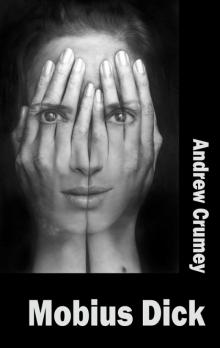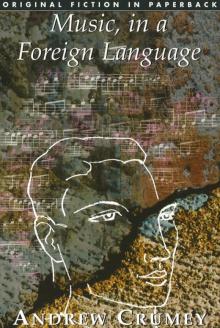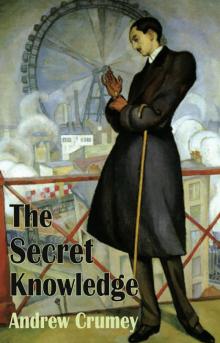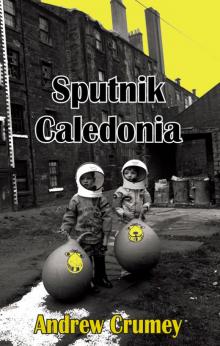- Home
- Andrew Crumey
Music, in a Foreign Language
Music, in a Foreign Language Read online
Praise for Music, in a Foreign Language
Winner of The Saltire Award for Best First Book in 1994, described in The Guardian Fiction Shortlist article as outstanding. One of The Scotsman’s Books of the Year.
“Watch Andrew Crumey, whose very different Music, in a Foreign Language handled real intricacies of time and ideas with astonishing maturity in a haunting, low-key up-date of 1984.”
Douglas Gifford in The Scotsman’s Books of the Year
“an accomplished exercise in European post-modernism.”
Catherine Lockerbie in The Scotsman
“an intriguing and illuminating post-modern meditation on betrayal, death, and paths not taken, both personal and historical. Employing fiction within a fiction, Crumey constructs a philosophical jigsaw puzzle, partly a portrayal of an alternative, Eastern European-style post-war Britain, partly the story of the exiled narrator’s life and of the characters in the novel he’s writing. A promising debut from a talented and unusual writer.”
The Herald
“Music, in a Foreign Language is complex in its change of time and points of view but entertaining, and at the same time very chilling in its convincing impression of life in a police state.”
Paul Scott on Scottish Television at The Saltire Awards
“… thought provoking”
Publishers Weekly
“He brilliantly interpolates passages from imaginary texts reminiscent of Borges and Calvino … Highly recommended for medium to large public and academic libraries, particularly for sophisticated readers.”
Library Journal
“The main theme of this very impressive first novel is that of the falsity of both fiction and reality; and I predict that Andrew Crumey is going to be one of the major novelists.”
Books in Scotland
“… his novel is elegantly mathematical in its ingenious plot and narrative, and highly suggestive about the music of Beethoven and Bach. Highly readable.”
Mario Relich in Chapman’s Magazine
“This intricate, demanding story of political and personal commitment and betrayal introduces a young master of post-modernist irony who will remind many readers of the brainier postwar European novelists. A formidable debut, from a new writer whose possibilities, so to speak, seem virtually unlimited.”
Kirkus Reviews
Contents
Title
Praise for Music, in a Foreign Language
Part One
Chapter 0
Chapter 1
Chapter 2
Chapter 3
Chapter 4
Part Two
Chapter 5
Chapter 6
Chapter 7
Chapter 8
Chapter 9
Chapter 10
Chapter 11
Chapter 12
Part Three
Chapter 13
Chapter 14
Chapter 15
Chapter 16
Chapter 17
Part Four
Chapter 18
Chapter 19
Chapter 20
Chapter 21
Chapter 22
Chapter 23
Chapter 24
Chapter 25
Part Five
Chapter 26
Chapter 27
Chapter 28
Chapter 29
Chapter 30
Copyright
PART ONE
0
She was asking me (as was usual at such moments) what I was thinking about. So that I quickly had to make up some suitable reply.
In fact I was thinking of two things. First, of that spectacular diversity which leads every woman to respond to the moment of sexual climax in a unique way. There are those who shout, or gasp, or groan. Those who bay like wolves beneath a silver moon, or sigh with the heartfelt passion of a diva. Some who laugh, as if they had only just got the joke, while others shed a tear of misplaced sorrow. Women who collapse in satisfied exhaustion, and others who get up in a state of restlessness and make a sandwich, switch on the television. Phone their mothers.
But she, throughout all those years we shared, maintained with total consistency that low growling, like a half-sleeping cat disturbed. And afterwards, if she did not fall asleep, she would puncture the silence by asking me that dreaded question: What are you thinking? Which would always send me scurrying in search of an appropriate answer, since I knew from experience that honesty was not what was required of me at such a time.
I told her I was thinking ‘nothing’.
This was not completely untrue; the path of my mental activity at that moment really was of no consequence, and could honestly be summed up in the dismissive manner I chose. But this nothing led – through no will of my own – to something. It had begun with her feline growling – the completion of the act we had just enjoyed. I now wanted only to have peace and quiet and a good night’s rest (I had – if I remember correctly – to catch the train earlier than usual the next day), but instead my thoughts were prodded into action by her refusal to let the business end. I found myself imagining those other women I had slept with, or thought of sleeping with – and all those countless women with whom I would never have the pleasure of broadening my knowledge of life’s rich diversity. I thought of that awesome variety, and I thought how strange it was that events should have brought the two of us together, so that I should listen to her cat-like purr, when I could equally well (had history gone otherwise) have found myself in the arms of a creature as different from my wife as a Chopin waltz is from a Bach fugue.
I mean this as no disrespect to the woman whom I now miss so much. But how could I confess to her then the speculations I was allowing – in a spirit of objective enquiry – into the alternative scenes which I might at that moment have found myself playing, if a thousand coincidences had been replaced by a thousand other equally probable ones?
My second thought was just as impossible to confess at the delicate moment my wife had chosen – for it concerned my need to relieve the bladder upon which she had not long before put much of her weight. I decided to bide my time. I told her I was thinking ‘nothing’.
Of course, one can truly be thinking nothing only if one is dead. Even in my most idle moments, taking the daily train journey to and from work, without a book or sheaf of writing paper to accompany me (until today), still my brain is filled with thoughts which, because they go unregistered, are regarded as having no existence. I gaze out of the window; I see the sunshine on brown earth, and olive trees, and if anyone asked me I would tell them I was thinking ‘nothing’. What a world of thoughts, impressions and sensations is thereby dismissed!
When I was sure she wasn’t going to ask me anything else, I went to the toilet.
All of this seems very clear now in my mind, as I prepare to write the novel which first suggested itself while I stood barefoot on the cold floor of the bathroom ten years ago. Can my memory really be so accurate and vivid? There is of course the possibility that this memory – along with the story I intend to unroll like a carpet before you – is a pure invention, or at least a confabulation; an accretion of successive imperfect rememberings. Can I be sure that the need to go to the toilet coincided with a vision of the orgasm in its infinite variety? Or that this was indeed the night when Duncan and Giovanna first entered my imagination? Perhaps these events actually occurred on separate occasions, after distinct instances of love making. However, since that act, after a very short time during the first year we were together, soon became indistinguishable from one time to the next, it is impossible to conclude the matter with any degree of certainty.
Memory is, after all, far more than the simple replaying of
the past. How can one remember, for instance, what it is like to see someone for the first time, when the image of them which you create in your mind is that of a face you have seen on a thousand occasions? Or how to remember a face seen only once? The image constantly amended with each successive act of recollection, until what is left bears little relation to what was originally seen. Whatever it really is (and I have often wondered), memory is not merely some kind of neurological video recorder.
But it was while in the bathroom, I feel sure of it, that the first manifestation took place of the story I hope now to write (if I am not disturbed too much from my work by the usual distractions which this daily journey offers me). Why should the idea have chosen that particular moment? Had it already perhaps been lurking incognito for a much longer time – for at least another ten years previously? I realized immediately that it must surely have been so.
Memories have their own vocabulary of associations and prompts. Often, while urinating, I am reminded of an unfortunate incident which took place when I was very young. In my haste to zip up my trousers after using the toilet, I managed to catch a very sensitive piece of skin between the two rows of teeth. Trying to pull the fastener back down so as to release myself only made the pain worse, and I cried out for help. My father came, and struggled with the zipper – making me yelp like a dog – but still to no avail. With his usual Biblical authority he said that this was the reason why button flies (such as he always wore) were far superior. None of which was of any help to me. Eventually, however, through the judicious use of some margarine, I was saved. Afterwards, my father laughed and said that if the operation had gone wrong I would have come out Jewish. Throughout half a century of living and peeing, the memory of that painful experience has come back to me time and again, whenever I am about to pull up my zip.
Fortunately, no such chain of memories intruded upon me on the night in question – the night which, I believe, was so crucial for everything that is to follow (since it was the night of this novel’s conception) – for the simple reason that I did not put on my trousers when I left my wife to go to the bathroom. Had I done so, then I would no doubt have found myself thinking again about my father, and all the many ways in which I had failed him; and then Duncan and Giovanna, and Charles King and all the other characters who would begin to occupy my thoughts for the following ten years might never have been able to walk, unannounced, into my imagination. But no such urinary madeleine appeared to disrupt the flow of thoughts; instead some other impulse prompted my mind. Some random observation – of the cold bathroom perhaps, or of my own sensations, became combined with another memory – less distant, and together these produced the germ of the story which I have successfully put off writing until today. What prompt or stimulus might have led my mind in the direction which it took? Probably something which would otherwise have been completely insignificant; like when you find yourself humming a melody, and trace back your thoughts until you realize that the casual remark of another person, or a word you read, or some object, has been the origin of a chain of events culminating in a tune which you can’t get out of your head. The novel I intend to write has felt rather like this. I say it all began that night as I stood in the bathroom, but this moment was itself a culmination of some other hidden process. But if I spend any more time thinking about it, then we can be sure it will be at least another ten years before I get anything done at all.
I relieved myself, and I did not suffer any sensations which might have carried me back to childhood memories of my father. But something made me think of a chance encounter long ago, and then I saw them, Duncan and Giovanna, meeting one day on a train. Where had these people come from? Where were they going? (Does anyone ever know where he has come from, or where he is going?)
My mind had now found a new association with which to torture me. Because whenever my wife and I now made love, I found that the act stimulated thoughts of these two mysterious people. They grew within me, resisting every effort I would make to suppress them. What are you thinking? my wife would ask, and I would have to dream up an appropriate lie, since really I was thinking about Giovanna, and whether she might be of the feline type or the lupine.
During the day, when I would get on with my paid work, it would be easy to forget all about those characters (teaching is such a wonderful way of making sustained mental activity quite impossible). It was during the nights that they would creep back – not every night, but frequently nevertheless. And whenever I saw them again, and the story which was beginning to encrust them, it always seemed slightly altered from the time before. Again, this might have been a trick of my imperfect memory. Or else they had begun – as writers always say – to ‘take on a life of their own’.
But I was not happy with the thought of these foreign lives springing up in my head, especially when they caused me such trouble in giving an honest answer to my wife’s customary post-coital interrogations. Because whenever she gave with a sigh that rhetorical question ‘what are you thinking?’, I was in fact thinking about how I might appropriately begin a novel about fate, and the strange contortions of history; and it would be about two people who meet on a train, and the turn of events (wholly arbitrary, like all fiction) which has caused them to come together in this way. Even less chance then, of confessing to my wife the thoughts which were distracting me – she would ask who was this Giovanna, and why did I propose to write about her instead of my own wife, and then I should no doubt have been caught in the trap of discussing in too much detail a past which I had always presented to her in carefully selected highlights.
It was, I am sure, during that moment in the bathroom that the whole story began – or at least its first embryonic version. During the years to follow, it was a story which would be rewritten in my mind countless times. Had I chosen to begin setting it down a year ago, it would all have gone completely differently; Duncan would have discovered the truth he sought concerning that fatal car crash, and Charles King would have been forced to confess everything to the younger man. And if I were to wait another year, no doubt there would be other differences; perhaps Duncan and Giovanna would finally come together in an embrace which I now feel determined to deny them. If I were to record all the stories which those poor people have endured already in my head, I should need a dozen novels, not just one. But the time has come now for me to choose the one which will be committed to paper. How sad it is to have to make that choice, and bid a final farewell to all those alternative scenarios. Rather like the fond adieu you must make to a world full of women, when you at last decide on one with whom to spend the rest of your life. Had your choice been otherwise, who can know whether things would have been better or worse; one can only say that it would all have been different.
But of course, one can extend this reasoning into every aspect of one’s life – by taking any particular course of action, one denies and loses for ever all the other paths along which one could have ventured. Sad, that life should have to be a gradual pruning of that great tree of possibilities, until one is left with a single trunk, leading to a single branch, and a single twig on the end of which one’s life reaches its ultimate conclusion.
And so I continued to dream of that other world in my imagination, and I began to feel like the most abject and faithless husband. When my wife would ask me what I was thinking about, I would long to tell her the truth; that I was thinking about how I ought to begin the novel I would one day write, about a man and a woman who meet on a train. And if I did tell her, then she would smile and ask if she were that woman, and I should have to tell her no, that it was another woman I was imagining, called Giovanna. And then she would pout with dismay, and she would berate me for my cruelty in talking about another woman while I lay with her. She would be jealous and hurt, and our life would be a misery until I promised to cease thinking of the invented woman whose face and voice refused to quit my mind. I knew I could never confess my fantasies, and this only made them all the more stubborn in their relentl
ess growth, and sent their roots further into the depths of my brain. I longed to be able to tell my wife everything; to brave her wrath, or scorn, and perhaps even persuade her to grow as interested as I myself was in the thoughts which were my delight and constant burden. But since I could never bring myself to discuss it with her, I was never able to resolve the question of how to embark on a story which I already saw in my head in a complete yet inexpressible form. If only I could sort out the first chapter, then surely everything else would naturally follow? But in order to make that initial step, I would first have to be able to overcome the sweet sense of guilt which coloured my speculations. I would have to tell my wife everything.
And this in turn became a scene which I saw and rewrote again and again – this confession to her of my thoughts. It was a scene which grew in my mind in just the same way as the story which it concerned. Once I could get things right with her, then I would be able to put aside all furtiveness, and set about fashioning the elusive first chapter. It was a problem which remained unresolved for ten years.
And it is only now – now that I am alone in the world – that I can see with sufficient clarity what the true opening should have been for this novel; an opening which denied itself to me for a decade but now emerges from the shadows of loneliness and sorrow, and presents itself to me like a new-born child.
A man is lying in bed with his wife; they have just made the most joyous act of love, and she asks him what he is thinking about. When he tells her, she does not frown or look annoyed. Nor does she express any displeasure when he says that he is thinking of the beginning of a novel – a novel which one day he will write and they will read together, the two of them, when they are old and past caring about life’s difficulties. A novel about two people who meet on a train. She asks him excitedly to tell her about it, and so he says that it all begins with an image; the image of a motor car crashing through a barrier, and tumbling down a hill. And now she tells him that she would like to hear the rest of it.

 Mobius Dick
Mobius Dick Music, in a Foreign Language
Music, in a Foreign Language The Secret Knowledge
The Secret Knowledge Sputnik Caledonia
Sputnik Caledonia